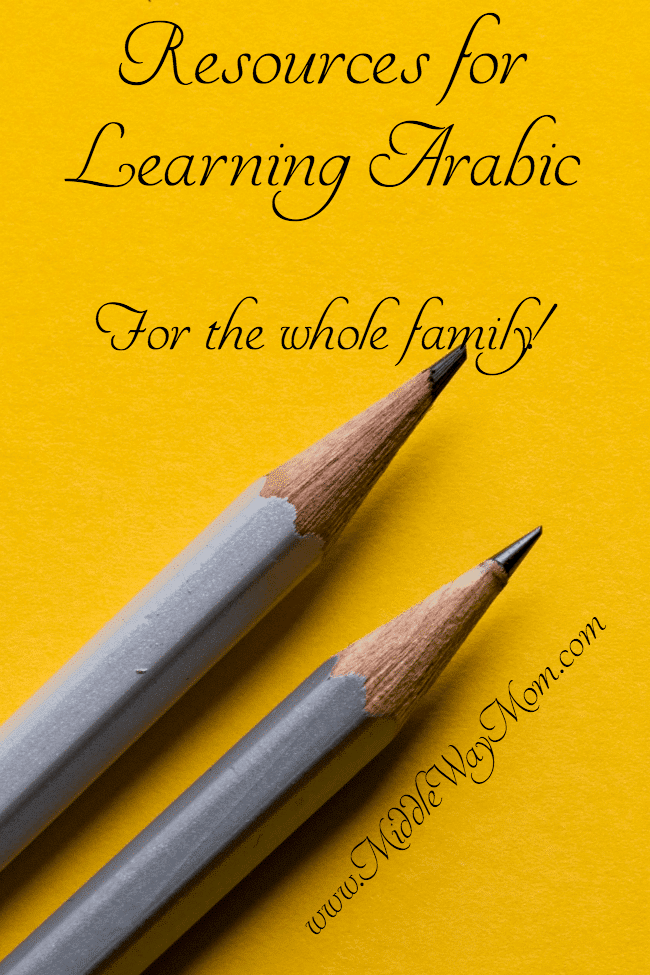How many times have we seen, “Learn Arabic in 5 days!” or “Learn Arabic the fast and easy way!”
Maybe people who have more time on their hands, or are far smarter than me, can learn a new language without much effort, but I’ve found that learning a language you don’t hear on an every day basis is a big challenge.
So why take the time to learn Arabic?
As Muslims, we gain so much by understanding the Qur’an on a deeper level, without needing translation. Also, many of the most revered classes are only available in Arabic. Learning Quranic Arabic opens a lot of doors for Muslims.

In our family, I have a goal that my young kids will be able to generally understand basic Arabic. I definitely want them to be able to have a basic understanding of what they are hearing during taraweeh, and in sha Allah they will have some familiarity in day to day conversations.
The problem? I don’t know Arabic. But I’m learning.
So, as I trudge through my mom-brain to try to stuff a new language in there, I’ve found some Arabic learning resources I think most people would find easy to use, and valuable.
Learn Arabic with an online class
My first resource will give you the most thorough knowledge of Arabic. Studio Arabiya offers one-on-one tutoring and online group classes, plus an option to study abroad, if you so choose. I’ve been taking a tutoring class with Studio Arabiya for the last year, and my oldest daughter took Qur’an classes with them for a number of years as well. It’s well worth the money, especially if you’re serious about learning Arabic.
One word of advice: if you aren’t satisfied with your teacher, just let the admin staff at Studio Arabiya know and they’ll help you find a teacher that works better for you. When you find the right teacher, it’ll feel like you’re having a class with your friend.
Online learning
I’ve reviewed Mango Languages in the past, and I much prefer their style to the well-known Rosetta Stone (Kira used RS for Mandarin Chinese). You’ll be able to introduce yourself, your family, talk about your home and surroundings, so by the completion of the program, you could hold a basic conversation in Arabic. Many libraries offer Mango Languages as a free service with a valid library card number. I signed up for an account through my library, and use the app to supplement my learning with Studio Arabiya
Notecard app
While learning new vocabulary through Studio Arabiya, I collected a large number of vocabulary cards, without much of a system of organizing them, or working through them. Of course, that meant I wasn’t reviewing my vocabulary, and learning has been slow (I feel bad for my teacher, but mashaAllah, she’s been quite patient). Finally I found an app that works, and I’ve slowly been converting all my cards over to digital format!
Flashcards Deluxe (there’s a free version to try out before you buy) allows you to keep multiple decks, and to combine decks for the purpose of studying. My favorite feature is that by default you study 10 cards at a time, and when you correctly answer a card after a number of times, it rotates it out for a new card. Also, you can attach pictures and audio to the cards, if that’s helpful for you. I also installed the Arabic keyboard to my iPhone (simply in the Settings app) so I could write the words using Arabic script.
Arabic learning DVDs
Arabian Sinbad is on top of my wish list. After watching some of their clips on their YouTube channel, I think they are most well done. Some other DVDs that my kids have liked (and I’ve benefited from) are Little Pim and Dino Lingo. Both are more about vocabulary than conversation, but the more we hear Arabic, the easier it is to learn.
If buying DVDs is not in the budget right now for your home, check out your library. Our library didn’t have any Arabic learning DVDs for kids, so I asked and they ordered some!
YouTube channels
Another supplement to my online tutoring, and trying to help hear words in a bigger context, is listening to Arabic videos on YouTube. Since my vocabulary is still quite novice, I try to find shows aimed at preschoolers, plus then I can watch it with my kids and we can learn together!
My favorite YouTube channels for Arabic learning are:
Print materials
We need some offline resources to round out our learning, in sha Allah! My favorite picture dictionary is 1000 Words and Pictures because it’s sorted by category (kitchen, garden, weather, etc.) and all the arabic words include all the vowel markings.
We also have a set of small arabic vocabulary posters that don’t appear to be available any more, but these Arabic vocabulary posters by Gateway to Arabic (which we used, and liked, with my oldest and her first Arabic tutor) are almost the same thing.
Learning arabic, whether online or using print materials, is rewarding, but it does take effort and consistency. In sha Allah you find value in some of the resources I’ve listed.
Do you have any Arabic learning resources you love?





Our bookshop offers beautiful games to learn Arabic including 2 card games and a cubes that you can use to teach children how to write in Arabic. They are a great way to learn the language while having fun. We do not speak Arabic but we still have fun with the card matching game (Arabicouple). Find out more at https://letoboggan.com.au/product-category/arabic/
Those look very cute! Thanks for sharing!